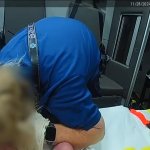COURT HOUSE – The City of Cape May went into Superior Court May 22 to force County Prosecutor Robert Taylor to remove the monitor he placed in its police department two months ago.
Judge J. Christopher Gibson heard arguments for over two hours, but made no ruling. Saying that he required more time to study the arguments, Gibson indicated that his ruling would come soon.
At a city council meeting four weeks ago, Jerry Gaffney, a former mayor, asked, “How did we get into this mess?” The “mess” Gaffney referenced includes the demotion of Police Chief Robert Sheehan back to his former rank of captain, resignation of a sitting council member, the holding of a closed press conference with a 26- page press release, a suit against the city by Sheehan, imposition of a monitor in the police department by Taylor, the suit to have the monitor removed now in Superior Court, and a recall effort aimed at forcing Mayor Edward Mahaney from office. Absent were the other three members of council.
The hearing was on the Friday before Memorial Day weekend, the official opening of the shore’s tourist season when the population of Cape May soars from under 4,000 to over 45,000. Pleas by citizens during council meetings urging the council to resolve these issues without using the courts have generally gone without comment or response.
Thirty Attend
The hearing drew an audience of over 30 including at least three chiefs of police from other county jurisdictions, William Murray, who retired from the council in January, Jack Wichterman, recent reappointed to the council to fill the vacancy left by the resignation in protest of Jerry Inderwies, Jr., Solicitor Anthony Monzo, City Manager Bruce MacLeod, and Charles and Patricia Hendricks, who are active in the effort to recall Mahaney.
Mahaney sat at the plaintiff’s table with Todd Gelfand, the attorney hired by the city to represent them in the action. At the defense table Taylor and his First Assistant Prosecutor Robert Johnson, presented their own case.
“Hostile Takeover” Alleged
Gelfand argued that Taylor had effectively engaged in a “hostile takeover” of the city’s police department. He said the effect of the monitor is to cut completely the “legitimate lines of authority” that should bind the department to the City Manager.
The city acknowledged a role that the county prosecutor plays in the handling of criminal investigations but argued that that role is far less expansive than the prosecutor says it is. What has happened, according to the city, is a complete removal of the department from the oversight of the lawful government of the city.
The city’s complaint further argues that the city retains the liability for actions of the department while having no control or oversight. According to the city, the way in which Taylor has imposed the monitor has extended the prosecutor’s authority to many things that “do not involve investigation or prosecution of criminal matters.”
The city made its argument in two lengthy filings prior to the hearing, the original complaint and a follow-up brief. The Prosecutor’s Office responded with two documents, an answer to the complaint and its own brief in opposition to the city’s position.
Taylor told Gibson that he felt compelled to assign the monitor after the city repeatedly released confidential information related to an internal affairs investigation in violation of Attorney General Guidelines which, Taylor added, have the force of law.
Taylor also pointed to the fact that while Sheehan had been removed as chief of police, he had been placed back in his former rank as captain and thus is still in charge of the department as its ranking officer. The next in line in the department is Lt. Chuck Lear, whose use of compensatory time was at the center of the investigation only recently concluded by Taylor’s office.
Taylor added that the city has no other officer of sufficient rank that it could appoint as an acting chief. Taylor saw the need for a monitor between city officials and Sheehan.
“The two most senior officers are at war with the city,” Taylor said. “The detention and arrest for crimes is being hampered by the City of Cape May.”
According to Taylor, the action of appointing the monitor was approved by the Attorney General’s Office and was necessary “to maintain the effectiveness of the department’s operations in the detection and arrest of offenders.”
“Wrongdoers…Unclean Hands”
The prosecutor’s brief explicitly states that “The City of Cape May and some of its officials are clearly wrongdoers.” Taylor’s brief goes on to claim that case law would deny “injunctive relief when the party requesting it has unclean hands.”
Case Law Lacking
In a new twist on the case, Gibson said he found no case law or statues that gave the county prosecutor authority to impose a monitor, especially in a situation where a municipality has not requested one. Taylor argued that the Attorney General’s Office signed off on the action.
The arguments exposed the efforts of the city to consider naming an acting chief.
Takeover Threatened
Taylor said that appointing an acting chief was something the city could do, but he made clear that he would not allow them to appoint a low-level officer. Should the city try to promote a sergeant to that position, for example, Taylor warned, “I’d take over the department.”
Right after the controversy began in March, the city hired retired State Police investigator James Fallon to conduct an investigation of the issues surrounding Lear’s use of comp time.
Although comments at council meetings indicated that Fallon’s investigation was completed, the city indicated to Gibson that one reason it wants the monitor removed is so that it can continue the investigation by having Fallon question Sheehan.
City’s Authority
Gelfand said that Taylor is preventing Fallon from completing his investigation with the prosecutor’s claim that chiefs are under his supervision. The city says that Taylor’s position is true only with respect to a criminal investigation. The city, Gelfand says, has authority in an administrative investigation.
Taylor also was critical of Mahaney. Pointing to the mayor’s recorded comments at an overflow city council meeting held at Convention Hall, Taylor said that Mahaney told the public that the case involved the theft of taxpayers’ money. “There was no theft,” Taylor said. He noted that Lear’s comp time was equal time off for time worked. He then added, “It’s a dispute that should be solved in a civil forum.”
The arguments went on and there was no indication how Gibson will rule.
Villas – I really am wondering how the last 4 years impacted those who said it was so bad. My life , I have health insurance, did not change, my life did not change. Covid was the big thing that Biden was…








